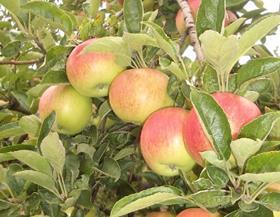
The Association of Polish Fruit and Vegetable Distributors invited delegates from United Arab Emirates to visit Poland in mid-May as part of an agricultural study tour that took in the biggest fresh fruit and vegetable distributors.
The tour was part of the ongoing informational and promotional campaign for Bicolored Apples from Europe, first launched in 2014 and supported by the European Union, Poland, the Agricultural Market Agency, and the Fruit and Vegetable Promotion Fund.
During the event, guests from the UAE had an opportunity to learn more about the sorting, packing and export certification systems that guarantee the fruits end up at their intended destination.
Delegates heard that Bicolored Apples from Europe are harvested manually and are compliant with high standards of hygiene and internal values, and are assessed for ripeness, starch, Brix and firmness.
They also learned that designated and trained packhouse staff conduct a full quality control check on a daily basis during the entire bicoloured apple sorting process, while additional sampling inspections are carried out by state inspection bodies.
Guests from UAE found out that prior to export, every shipment of bicoloured apples is subject to phytosanitary and pesticide residue inspection by the NPPO, which confirms that the plant product complies with phytosanitary requirements of the country of destination as nominated by the exporter.
Visitors used the opportunity to have a closer look at the storage facilities, where the fruit goes straight from harvest, as well as at the sorting and packing lines.
One of the items on the schedule was an orchard tour, where the delegates could see the modern irrigation systems and hail nets spread over the trees, a technique increasingly popular across Europe. It allows for regulating the colouration of the apple skin, but also protects the trees from hailstorms, which are a frequent occurrence in some regions.



